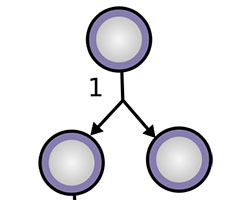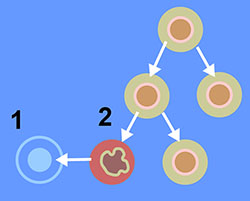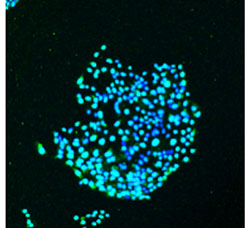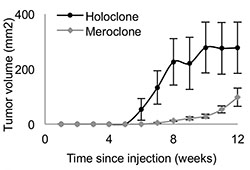
How Stem Cells Affect Cancer
What's in the Story?

It's near the end of class, and you've been sitting still for what seems like ages. You are listening to your teacher, and you haven't been talking, passing notes, or making funny faces. It's good to follow the rules in class, but would you act the same way at a birthday party? No way. At the birthday party, you probably talk, run around, and make all kinds of funny faces.
Your environment affects how you behave. This is also true for your cells. Cells determine their behavior using their surroundings, which is why the same cell may act differently based on the type of environment in which it is found.
But this isn't just for cells that work to keep your body healthy. Cancer cell colonies may also act differently depending on their surroundings, such as what other cells are around them.
What Does Cancer Have to Do with Stem Cells?

There are trillions of cells within the human body that each have a specific job, like making up your muscles or skin. After they serve their purpose they do not live very long before new cells replace them. But your body also has very special different types of cells called stem cells. These cells have a very long cell life, and continue to divide and create new stem cells for as long as you are alive.
Normally, the ability of some cells to live for a long time and reproduce is a good thing and helps to keep your body healthy. However, in some cases it may not be. For example, some types of cancer cells behave very much like stem cells. Cancer describes a wide variety of diseases that all involve the abnormal growth of cells.
Cancer cells don't stop dividing when normal cells would. This means that instead of dying after a short time, cancer cells continue to survive. And just like a stem cell these cancer cells will keep dividing to create more cancer cells. When cancer cells keep dividing, large numbers of them can group together and form a tumor. This can be very harmful to the body.

The ability for cancer cells to keep dividing makes it difficult for a sick individual to get rid of the cancer in his or her body. Many tumors are believed to contain cancer stem cells - stem cells that are able to give rise to more cancerous cells. Many scientists believe that in order to find a cure for cancer we must understand how to stop the cancer stem cells. In this experiment, scientists set out to understand how different cell colony types can affect the rates of growth of cancerous cell colonies.
Looking at Cancer Colonies
Scientists began the experiment by obtaining some cancerous cells from a human prostate. Single cancer cells were placed in environments that would allow them to grow. These cells grew to form colonies of two types: either holoclones or meroclones. These are specific types of cell colonies that contain stem cells.
Scientists then monitored the growth of new cells in each of these cell colony types. By monitoring the number and type of cells that formed and how fast they grew, scientists were able to determine how cancer cell reproduction may depend on the type of cancer cell colony that is growing.
Holoclones, Meroclones, and Cancer
Until now, scientists knew that holoclones could give rise to other holoclones, meroclones, and regular cells. On the other hand, meroclones were thought to only give rise to meroclones and regular cells, but not holoclones.

In this experiment scientists noticed that when holoclones divided to create new cells, most of the resulting cell colonies were holoclones, as expected. Holoclones are very fast-growing colonies, as they are creating more and more holoclones all the time.
But when scientists looked at growth in the meroclone colonies that had cancer cells, they found that the meroclones gave rise to both holoclones and meroclones. This meant that meroclones are capable of producing holoclones, even though this was previously thought to be impossible.
Testing Tumors in Real Life
The final part of the experiment was performed using mice, to learn if the differences in these cell colonies would affect tumor growth in animals. Holoclone and meroclone cell colonies were injected into male mice. Scientists then observed these mice to monitor any tumors that grew as a result of the injection. Five weeks after injecting the mice, any tumors present were removed to be further studied.

Overall, mice that had been injected with holoclones tended to form very large tumors. That finding was expected, as holoclones are very fast-growing colonies. Mice injected with meroclones tended to have much smaller tumors and were slower to make the same number of meroclone type cells.
However, some meroclones were also able to make holoclones. Scientists reached the conclusion that cancer stem cell colonies can act differently than normal cell colonies. These colonies can also have different effects on tumor growth.
Understanding how cancerous cells affect growth of cell colonies with stem cells could help future researchers learn how to limit cancer growth more effectively.
For example, after being diagnosed with cancer, most people receive treatment to kill the cancer cells. However, in many people the cancer cells will return. Some scientists believe this is because there are cancer stem cells in tumors that are hard to kill. If these cancer stem cells are not killed, they can regrow and result in a whole new tumor.
Experiments like this one, which study stem cell behavior in cancer cells, are important for understanding how to design new treatments that can target cancer stem cells, and prevent the cancer from coming back.
Additional images via Wikimedia Commons. Image of cancer cell being attacked by Susan Arnold.
Bibliographic details:
- Article: How Stem Cells Affect Cancer
- Author(s): Heather Geissel
- Publisher: Arizona State University School of Life Sciences Ask A Biologist
- Site name: ASU - Ask A Biologist
- Date published:
- Date accessed:
- Link: https://askabiologist.asu.edu/plosable/how-stem-cells-affect-cancer
APA Style
Heather Geissel. (). How Stem Cells Affect Cancer. ASU - Ask A Biologist. Retrieved from https://askabiologist.asu.edu/plosable/how-stem-cells-affect-cancer
Chicago Manual of Style
Heather Geissel. "How Stem Cells Affect Cancer". ASU - Ask A Biologist. . https://askabiologist.asu.edu/plosable/how-stem-cells-affect-cancer
Heather Geissel. "How Stem Cells Affect Cancer". ASU - Ask A Biologist. . ASU - Ask A Biologist, Web. https://askabiologist.asu.edu/plosable/how-stem-cells-affect-cancer
MLA 2017 Style

When we think of cancer, we often think in simple terms: seek and destroy. But it turns out cancer cells can be much more complex. They can grow differently based on their surroundings.
Be Part of
Ask A Biologist
By volunteering, or simply sending us feedback on the site. Scientists, teachers, writers, illustrators, and translators are all important to the program. If you are interested in helping with the website we have a Volunteers page to get the process started.
